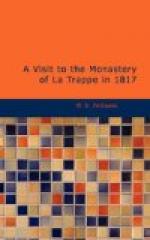La Vendee is an extremely interesting district, not merely on account of the singular and heroic warfare that was carried on there so long, but also from the appearance of the country, and the manners, opinions, and general character of its inhabitants; and Le Bocage is, in all these respects, the most interesting part of La Vendee. In Le Bocage, the war was carried on with most wonderful vigour and pertinacity, as well as with almost unparalleled destruction and cruelty. Those who are acquainted only with the other parts of France, can form no idea of the aspect of this district, or of the manners of its inhabitants; they differ so widely and essentially, that they seem to belong to another portion of the globe. It has always been regarded as the most fertile country in France; and, before the revolution, it was undoubtedly one of the most populous.
There are only two roads in the whole country: one of them runs from Nantes to la Rochelle, and the other from Bordeaux to Tours, through Poitou: all the rest of this district is a complete labyrinth: there are indeed numerous pathways, so very winding and narrow, that they are much more calculated to harass and mislead, than to assist a traveller in his journey: these pathways are flanked by wide and deep ditches, and almost rendered completely dark by lofty hedges on each side of them, the trees of which meet at top, and thus form an arch: hence they are rough and uneven in summer, besides being intolerably hot, and deep and miry in winter. To add to these inconveniences, the bed of a rivulet flowing along them frequently constitutes the only passage. Even when the traveller, after toiling along these dreadful pathways, comes near a town or village, he generally finds that the approach to it is practicable only by ascending irregular steps, cut out of the solid rock, on which they are built. The inhabitants themselves even are frequently puzzled by these pathways; and, after wandering for a considerable length of time, at last find out that they have been travelling in a wrong direction.
The whole country bears the appearance of an extensive and thick forest: this arises from the nature of the enclosures; they are extremely small, often not more than fifty or sixty perches, surrounded with strong hedges planted in the banks. These circumstances alone would give the appearance just noticed; but the effect is much increased from other causes. On each side of the banks, on which the trees are planted, there are ditches and drains, and the moisture which they constantly supply to their roots, renders their growth very rapid and luxuriant; so that when we consider the number of the trees and their great size, we shall not be surprised that the country looks like an immense forest. Sometimes the trees are so disposed as to answer the purpose of a palisade; and this purpose they answer most effectually, not only from the great size and strength of the trees themselves, but also from the intervening spaces between them being filled up with strong and impassable underwood [10].




